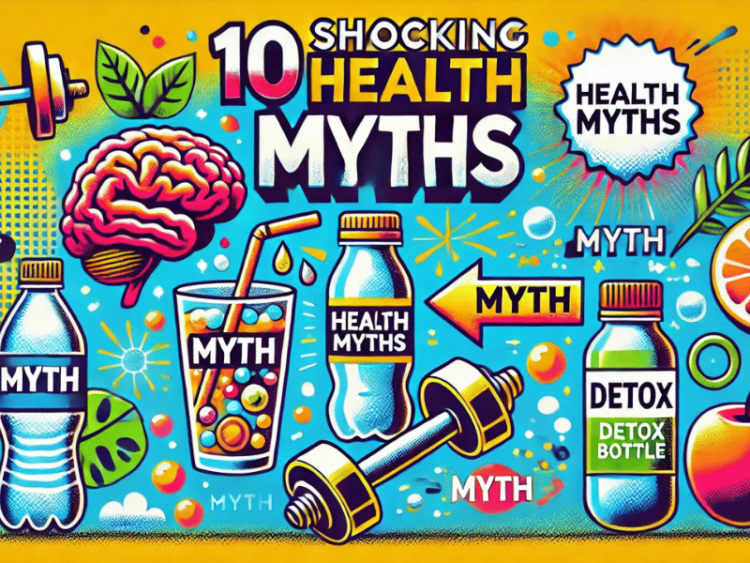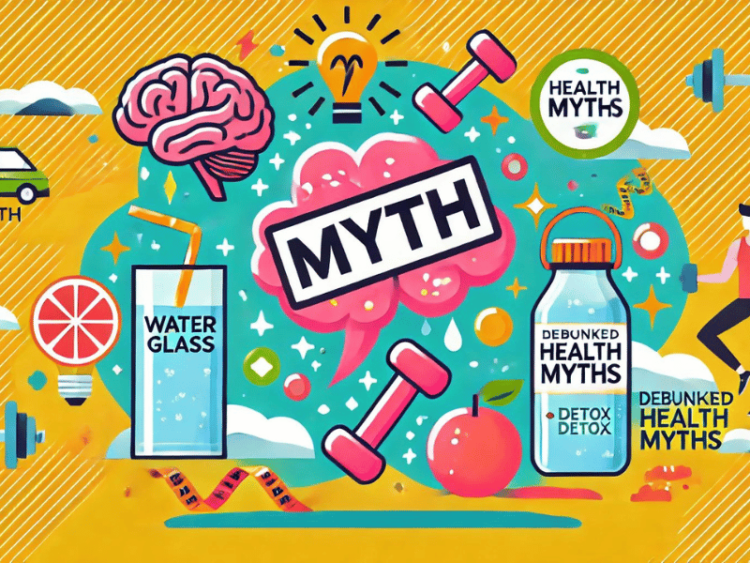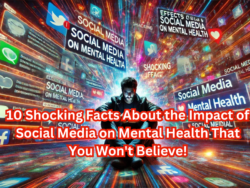10 Shocking Health “Facts” You Won’t Believe Are Myths!

Health and wellness advice is everywhere—from social media to well-meaning friends—but not everything you hear is grounded in fact. In fact, some of the most widely accepted health “facts” are actually myths that can lead to confusion or even harm. Here are ten common health myths debunked that you might be surprised to learn aren’t true.
1. Myth: You Only Use 10% of Your Brain
This myth has been popularized by movies and self-help gurus alike, but it’s completely false. Neuroscientific research has shown that nearly all parts of the brain have a known function, and brain scans reveal that even simple tasks require widespread brain activity. If we only used 10% of our brains, injuries to the remaining 90% would have no impact on our functionality, which is obviously not the case (Psychology Today).
2. Myth: Cardio is the Best Way to Lose Weight
For years, cardio has been championed as the ultimate weight-loss exercise, but recent studies suggest that strength training is equally, if not more, effective. Strength training boosts your metabolism and increases lean muscle mass, which helps in burning more calories even when at rest. So, while cardio is great for heart health, don’t skip the weights if weight loss is your goal (Welcome to UCLA Health).
3. Myth: Drinking 8 Glasses of Water a Day is Necessary
The “8×8 rule” (eight 8-ounce glasses of water a day) is not scientifically backed. Hydration needs vary widely depending on your diet, climate, and physical activity. Foods like fruits and vegetables contribute to your daily fluid intake, and your body signals when it needs more water, typically by making you feel thirsty. Listen to your body rather than sticking rigidly to this myth (Welcome to UCLA Health) (Southern New Hampshire Health).
4. Myth: Fat-Free Foods Are Healthier
The low-fat craze of the ’90s left many people believing that fat-free products are healthier. However, these foods often contain added sugars or artificial ingredients to compensate for the loss of flavour. Healthy fats are essential for brain function, hormone production, and nutrient absorption, so don’t shy away from avocados, nuts, and olive oil (Southern New Hampshire Health).
5. Myth: You Can Target Fat Loss in Specific Areas
No matter how many crunches you do, they won’t specifically burn off belly fat. Fat loss happens uniformly across the body and is largely determined by genetics. The idea of “spot reduction” is a myth. The best strategy is a combination of regular exercise and a balanced diet to reduce overall body fat (Welcome to UCLA Health).

6. Myth: Detoxes and Cleanses Are Necessary to Remove Toxins
Detox diets and cleanses are often marketed as essential for ridding your body of toxins, but your liver and kidneys do this naturally and effectively. There’s no scientific evidence that detox products provide any benefits, and in some cases, they might even be harmful by causing nutrient deficiencies or digestive issues (Welcome to UCLA Health).
7. Myth: Eating After 8 PM Causes Weight Gain
It’s not the timing of your meals but the total calorie intake and physical activity that matter. While late-night snacking can lead to overeating, especially if you’re choosing high-calorie, low-nutrient foods, eating at night alone isn’t inherently fattening. It’s more about what and how much you’re eating throughout the day (Southern New Hampshire Health).
8. Myth: All Calories Are Equal
While a calorie is technically a unit of energy, the source of that calorie can have different effects on your body. For instance, 100 calories from a sugary drink will affect your blood sugar levels differently than 100 calories from nuts, which also provide fibre and healthy fats. The quality of your calories is just as important as the quantity (Welcome to UCLA Health).
9. Myth: You Must Stretch Before Exercising to Prevent Injury
Stretching before exercise has long been thought to prevent injury, but research suggests that static stretching might actually weaken muscles temporarily. A better approach is to warm up with light activity, like jogging or dynamic stretches, to prepare your muscles for more intense exercise (Southern New Hampshire Health).
10. Myth: Natural Ingredients Are Always Safe
Just because something is labelled as “natural” doesn’t mean it’s safe. Many natural substances can be harmful or interact dangerously with medications. It’s important to research and consult healthcare providers before using supplements or other “natural” products (Welcome to UCLA Health).
Health myths can be misleading and sometimes dangerous. Understanding the truth behind these myths can help you make better decisions for your well-being. Did any of these surprise you? Share this post with your friends and family to debunk these myths and spread accurate health information!





